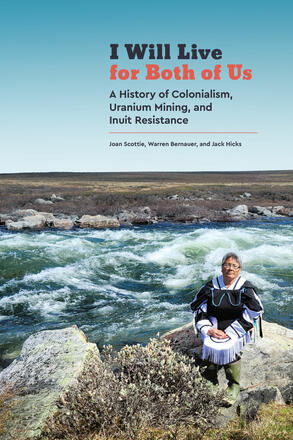
I Will Live for Both of Us
A History of Colonialism, Uranium Mining, and Inuit Resistance
Description
Born at a traditional Inuit camp in what is now Nunavut, Joan Scottie has spent decades protecting the Inuit hunting way of life, most famously with her long battle against the uranium mining industry. Twice, Scottie and her community of Baker Lake successfully stopped a proposed uranium mine. Working with geographer Warren Bernauer and social scientist Jack Hicks, Scottie here tells the history of her community’s decades-long fight against uranium mining.
Scottie's I Will Live for Both of Us is a reflection on recent political and environmental history and a call for a future in which Inuit traditional laws and values are respected and upheld. Drawing on Scottie’s rich and storied life, together with document research by Bernauer and Hicks, their book brings the perspective of a hunter, Elder, grandmother, and community organizer to bear on important political developments and conflicts in the Canadian Arctic since the Second World War.
In addition to telling the story of her community’s struggle against the uranium industry, I Will Live for Both of Us discusses gender relations in traditional Inuit camps, the emotional dimensions of colonial oppression, Inuit experiences with residential schools, the politics of gold mining, and Inuit traditional laws regarding the land and animals. A collaboration between three committed activists, I Will Live for Both of Us provides key insights into Inuit history, Indigenous politics, resource management, and the nuclear industry.
Reviews
“I Will Live For Both of Us shows the dynamics of ‘resource colonialism’ through the life experiences and struggles of an Inuit leader. As such, it draws invaluable political conclusions while providing an inspiring narrative of resistance.”
- John Clarke
“The authors bring detailed insights into the context of neoliberal resource extraction and ongoing processes of colonial dispossession, making the book of great interest for Inuit, Canadian, and international audiences, alike. The text, dynamic and accessible without forsaking depth, will certainly lend itself to research, classroom and popular reading. And its focus on historical and contemporary Inuit resistance will provide inspiration—and, indeed, a suite of tactics—for community organizers.”
- Rebecca Hall
"This book is a fascinating look into a little-known struggle, presented in a format that is deeply personal and emotionally engaging, but also analytical and informative. The specific political and institutional critiques are crucially important to anyone working in or trying to understand the part of the Arctic claimed by Canada."
- Peter Kulchyski
- MiningWatch Canada, February 27, 2023
This book should be read, first and foremost, by young activists who want to read, learn from and perhaps be inspired by a David and Goliath story; by northernists and those interested in the politics of northern development; by environmentalists concerned about how their concerns are dealt with at the extraction end of world; by students of modern treaties and Indigenous rights and culture who want to know what happens after a treaty is settled."
- Peter Kulchyski